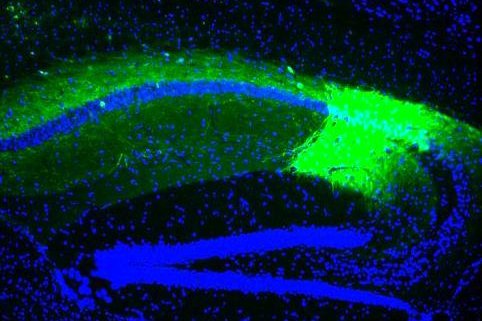Researchers have discovered abnormalities of blood vessels in the brain could play a major role in the development of schizophrenia. Pictured, this is a mouse hippocampus injected with adeno-associated virus expressing green fluorescent protein. Photo by Dr Matthew Campbell/Trinity College Dublin
Oct. 10 (UPI) -- Researchers have discovered abnormalities of blood vessels in the brain could play a major role in the development of schizophrenia.
The discovery, by a team of scientists from Trinity College Dublin and the Royal College of Surgeons in Ireland, or RCSI, could lead to new treatments for the mental health disorder.
About 1.1 percent of adults in the United States live with schizophrenia, and roughly 18.5 percent of adults in the country have mental illness.
The new study, published today in Molecular Psychiatry, showed that abnormalities in the integrity of the blood-brain barrier, or BBB, may be vital to the development of schizophrenia and other brain disorders.
The BBB is the network of blood vessels in the brain that regulates the transportation of energy and materials in and out of the brain.
"Our recent findings have, for the first time, suggested that schizophrenia is a brain disorder associated with abnormalities of brain blood vessels," Dr. Matthew Campbell, an assistant professor in Neurovascular Genetics at Trinity, said in a press release. "The concept of tailoring drugs to regulate and treat abnormal brain blood vessels is a novel treatment strategy and offers great potential to complement existing treatments of this debilitating disease."
People who have the chromosomal abnormality 22q11 deletion syndrome, or 22q11DS, are 20 times more likely to develop schizophrenia. They lack approximately 40-60 genes in a small region in one of the pairs of chromosome 22. The gene Claudin-5 is located in the same region, and changes to levels of this component of the BBB are linked to the presence of schizophrenia.
Researchers screened post-mortem brain samples from the Stanley Medical Research Institute were the first to identify a molecular genetic component of the BBB with the development of schizophrenia.
"We have shown for the first time that dysfunction of the blood-brain barrier may be an important factor in the development of schizophrenia," said Professor Kieran Murphy, head of the Department of Psychiatry, RCSI and Consultant Psychiatrist at Beaumont Hospital. "These findings greatly add to our understanding of this debilitating and socially isolating condition."















